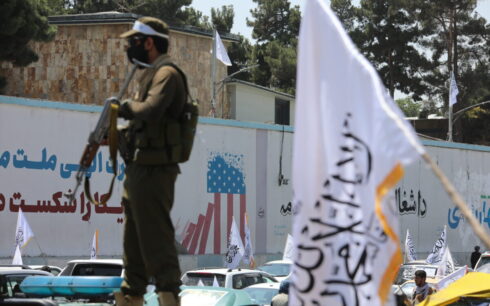Recent comments made by Mohammad Mohaqiq, a member of the Resistance Council for the Salvation of Afghanistan, regarding the United States’ presence in Afghanistan at a Moscow meeting, have elicited responses from analysts who view these statements as efforts to secure Russia’s support.
During the meeting on Afghanistan in Moscow on Thursday, Nov. 24, Mohaqiq labeled the two-decade-long presence of the United States in Afghanistan as “illegal,” holding it responsible for the current challenges faced by Afghanistan.
“The cause of all the miseries in Afghanistan is the 20-year illegal presence of the United States, and all the tragedies are shared between them [the United States] and the Taliban,” Mohaqiq asserted in a statement to reporters following his address.
He argued that the crisis in Afghanistan can be resolved by the regional countries rather than the United States.
Analysts pointed out Mohaqiq’s previous government roles during the US presence, highlighting his high-ranking political positions for two decades in a government supported by the United States.
In December 2001, Mohaqiq served as the deputy of the interim government formed under the Bonn agreement, directly supported by the United States during its military presence in Afghanistan.
Within the government structure established by the US, Mohaqiq assumed various key positions, including planning minister, House of Representatives member, and, ultimately, Afghanistan’s deputy executive directorate—a pivotal role during the 2014 US elections.
In 2021, Mohaqiq became Ashraf Ghani’s senior adviser on security affairs, all the while describing Ghani as a puppet of the Americans.
Wali Forozan, a political affairs analyst, remarked, “They made the most of America’s presence in Afghanistan. They were the ones who gave legitimacy to America. They worked with them and took a stand.”
Despite participating in peace talks before the Taliban’s takeover, Mohaqiq’s recent criticisms come after meetings with US special envoy for Afghanistan, Thomas West, on April 17, 2023, and an American delegation on January 11, 2023.
University professor Akmal Baqa dismissed these statements as an attempt to attract Western and US attention, stating, “These other politicians have no place as representatives of Afghanistan on international stages.”
The US had anticipated that peace negotiations in 2021 would result in a government inclusive of the Taliban, Ashraf Ghani’s administration, and political groups. However, on August 15th, the equation shifted, sidelining other political forces except the Taliban. Mohaqiq alleges that the US-Taliban peace deal resulted in the “destruction of Afghanistan.”
While Mohaqiq worked for years within the system supported by the Taliban, he now perceives the peace agreement as revenge against the country.
Despite requests for comment from Amu, Mohaqiq did not respond regarding his remarks at the Moscow meeting.





